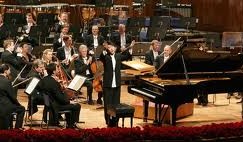How much has the LSO given up for Simon Rattle?
mainThe implications have started to sink in. In their eagerness to land Simon Rattle before he responded to an American vacancy, the London Symphony Orchestra have awarded him the title of Music Director. He is the first to hold it. All past chiefs of the LSO have been Principal Conductor, with essential powers remaining in players’ hands.
The official list:
Principal Conductor
Hans Richter
Sir Edward Elgar
Arthur Nikisch
Sir Thomas Beecham*
Albert Coates
Willem Mengelberg*
Sir Hamilton Harty
Josef Krips
Pierre Monteux
Istvan Kertesz
Andre Previn
Claudio Abbado
Michael Tilson Thomas
Sir Colin Davis
Valery Gergiev
What’s the difference?
In modern parlance, the music director is responsible for every programme, every guest conductor, every artistic decision. He also has the power to hire and fire players. The LSO players who own the company, have guarded this power fiercely to themselves, firing past chiefs over such differences.
If they have now given Rattle the ultimate say on personnel, they will have surrendered their virtue on the first date and will begin the relationship from a position of disadvantage. This is not the LSO we know. We await the details of the deal, but it’s starting to look as if they have given away a lot in the heat of passion.






Comments